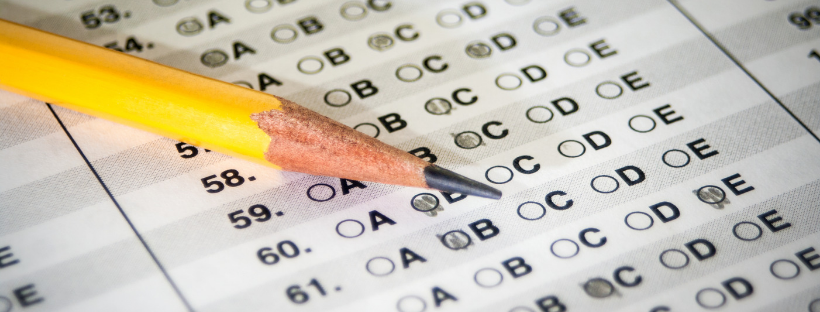STARTING SECONDARY
Preparing your child for the start of “big school” can be daunting. They’re nervous. You may be nervous too. It’s a big step up and you know there is going to be lots more homework and higher expectations. On top of all that, not long after the start of term, your child may have to take a number of tests, namely CATs or Cognitive Ability Tests.
WHAT ARE COGNITIVE ABILITY TESTS (CATS)?
CATs are marked tests which assess your child’s general intelligence. They differ from SATs in that they test ability rather than knowledge. The results are used as a benchmark of your child’s overall intelligence, abilities and potential.
They can also be used in order to help the school stream your child (either in all subjects or just in certain subjects) and to predict future achievements such as GCSEs and National 4 and 5s. In fact, the results can be used as a benchmark of your child’s progress throughout their secondary years.
The results should also help the school spot any issues and identify where your child might need some support. Not all secondary schools use CATs, but many do. In Scotland, many schools use CAT tests throughout primary and secondary.
WHAT DO CATS ASSESS?
There are four main areas which are assessed:
Verbal Reasoning – Thinking and problem solving with words
Non-Verbal Reasoning – Thinking and problem solving with shapes and space
Quantitative Reasoning – Thinking and problem solving with numbers
Spatial Reasoning – Visualising, picturing and moving shapes around
UNDERSTANDING THE RESULTS
Much like SATs, the results are given as Standardised Age Scores, with the average score for Year 7 being 100. Your child will normally receive a score therefore somewhere between 90 and 110.
BUT WHAT ABOUT MY CHILD’S SATS RESULTS?
Even though your child has taken their SATs in the summer term of Year 6, many secondary schools will still retest at the beginning of Year 7. This is to help them get a better understanding of your child’s ability and any issues they may have. CATs are a different type of test.
DOES MY CHILD NEED TO REVISE OR PREPARE FOR CATS?
Whereas SATs tested your child’s knowledge, CATs test ability and potential. Official past papers are not available for revision purposes and so practising specific content is both difficult and not particularly helpful. In fact, CATs are designed to be taken without revision.
THE IMPORTANCE OF REASONING SKILLS FOR GCSE
However, as you can see from above, CATs are all about your child’s reasoning skills. In fact, reasoning is an increasingly important part of the National Curriculum during Key Stages 3 and 4 and ultimately forms part your child’s GCSEs. But reasoning skills are not always taught consistently well at primary school level. What’s more, it is always beneficial to help your child develop their reasoning skills both for life at school and at home.
SCOTLAND’S NATIONAL 4 AND 5 QUALIFICATIONS
When it comes to National 4 and 5 qualifications, more emphasis is now also being placed on “deeper learning”, requiring your child to show how much they understand a subject rather than simply regurgitate memorised facts. Your child needs to demonstrate they can analyse and apply what they have learned, and this of course comes back to their reasoning skills.
REASONING EXPLAINED
Reasoning is quite hard to define. It means systematic thinking, problem solving and with maths, it involves thinking through mathematical problems logically in order to arrive at an answer. It also involves being able to identify what is important and what isn’t and the ability to explain a solution. As such, it is at the very heart of your child’s mathematical ability both in school and in practical day to day life.
Verbal reasoning (i.e. thinking with words) is equally important and involves problem-solving, thinking about texts, following written instructions to come up with a solution and the ability to analyse.
Strong reasoning skills can help build your child’s confidence and are also important across all other subjects including science, history, geography and languages. The ability to reason well doesn’t just affect the outcome of your child’s GCSE or National 4 and 5s, it’s a critically important life skill which can have a great impact on many careers.
DEVELOPING YOUR CHILD’S REASONING SKILLS
The good news is, that as a skill, reasoning is something that can be developed with a little help. At MagiKats we have specifically developed our programmes to include verbal and non-verbal reasoning skills.
Specially trained mentors work with students through worksheets and hands-on activities in the traditional MagiKats style to help develop your child’s skills. Reasoning is studied alongside the regular maths and English programmes, for any student aged from roughly 9 to 14.
IT'S NOT TOO LATE
With the new term on the horizon, it’s a sensible and ideal time to enrol your child on a MagiKats programme in order to help build and improve their reasoning skills in advance of their CATs next term.
But it’s never too late to start developing your child’s reasoning skills, whether you’ve had their CATs result already (and are worried they didn’t do as well as you’d expected or hoped), whether they have tests coming up, or whether they’re starting their GCSE or National 4/5 courses.
If you’d like to know more about CATs tests, or enrol your child on a MagiKats programme, please get in touch.




